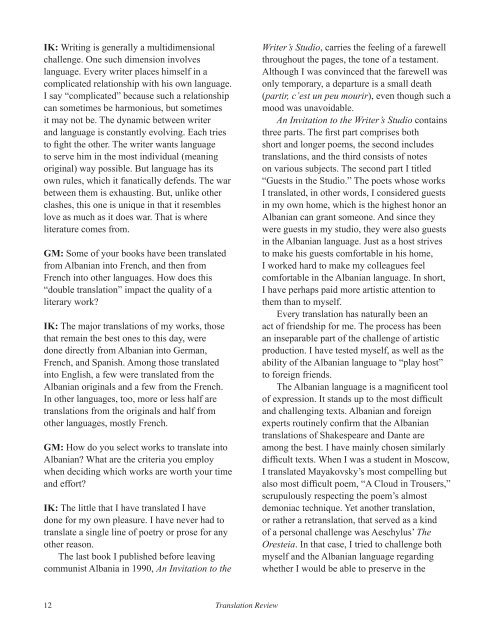Table of contents - The University of Texas at Dallas
Table of contents - The University of Texas at Dallas
Table of contents - The University of Texas at Dallas
You also want an ePaper? Increase the reach of your titles
YUMPU automatically turns print PDFs into web optimized ePapers that Google loves.
IK: Writing is generally a multidimensional<br />
challenge. One such dimension involves<br />
language. Every writer places himself in a<br />
complic<strong>at</strong>ed rel<strong>at</strong>ionship with his own language.<br />
I say “complic<strong>at</strong>ed” because such a rel<strong>at</strong>ionship<br />
can sometimes be harmonious, but sometimes<br />
it may not be. <strong>The</strong> dynamic between writer<br />
and language is constantly evolving. Each tries<br />
to fight the other. <strong>The</strong> writer wants language<br />
to serve him in the most individual (meaning<br />
original) way possible. But language has its<br />
own rules, which it fan<strong>at</strong>ically defends. <strong>The</strong> war<br />
between them is exhausting. But, unlike other<br />
clashes, this one is unique in th<strong>at</strong> it resembles<br />
love as much as it does war. Th<strong>at</strong> is where<br />
liter<strong>at</strong>ure comes from.<br />
GM: Some <strong>of</strong> your books have been transl<strong>at</strong>ed<br />
from Albanian into French, and then from<br />
French into other languages. How does this<br />
“double transl<strong>at</strong>ion” impact the quality <strong>of</strong> a<br />
literary work<br />
IK: <strong>The</strong> major transl<strong>at</strong>ions <strong>of</strong> my works, those<br />
th<strong>at</strong> remain the best ones to this day, were<br />
done directly from Albanian into German,<br />
French, and Spanish. Among those transl<strong>at</strong>ed<br />
into English, a few were transl<strong>at</strong>ed from the<br />
Albanian originals and a few from the French.<br />
In other languages, too, more or less half are<br />
transl<strong>at</strong>ions from the originals and half from<br />
other languages, mostly French.<br />
GM: How do you select works to transl<strong>at</strong>e into<br />
Albanian Wh<strong>at</strong> are the criteria you employ<br />
when deciding which works are worth your time<br />
and effort<br />
IK: <strong>The</strong> little th<strong>at</strong> I have transl<strong>at</strong>ed I have<br />
done for my own pleasure. I have never had to<br />
transl<strong>at</strong>e a single line <strong>of</strong> poetry or prose for any<br />
other reason.<br />
<strong>The</strong> last book I published before leaving<br />
communist Albania in 1990, An Invit<strong>at</strong>ion to the<br />
Writer’s Studio, carries the feeling <strong>of</strong> a farewell<br />
throughout the pages, the tone <strong>of</strong> a testament.<br />
Although I was convinced th<strong>at</strong> the farewell was<br />
only temporary, a departure is a small de<strong>at</strong>h<br />
(partir, c’est un peu mourir), even though such a<br />
mood was unavoidable.<br />
An Invit<strong>at</strong>ion to the Writer’s Studio contains<br />
three parts. <strong>The</strong> first part comprises both<br />
short and longer poems, the second includes<br />
transl<strong>at</strong>ions, and the third consists <strong>of</strong> notes<br />
on various subjects. <strong>The</strong> second part I titled<br />
“Guests in the Studio.” <strong>The</strong> poets whose works<br />
I transl<strong>at</strong>ed, in other words, I considered guests<br />
in my own home, which is the highest honor an<br />
Albanian can grant someone. And since they<br />
were guests in my studio, they were also guests<br />
in the Albanian language. Just as a host strives<br />
to make his guests comfortable in his home,<br />
I worked hard to make my colleagues feel<br />
comfortable in the Albanian language. In short,<br />
I have perhaps paid more artistic <strong>at</strong>tention to<br />
them than to myself.<br />
Every transl<strong>at</strong>ion has n<strong>at</strong>urally been an<br />
act <strong>of</strong> friendship for me. <strong>The</strong> process has been<br />
an inseparable part <strong>of</strong> the challenge <strong>of</strong> artistic<br />
production. I have tested myself, as well as the<br />
ability <strong>of</strong> the Albanian language to “play host”<br />
to foreign friends.<br />
<strong>The</strong> Albanian language is a magnificent tool<br />
<strong>of</strong> expression. It stands up to the most difficult<br />
and challenging texts. Albanian and foreign<br />
experts routinely confirm th<strong>at</strong> the Albanian<br />
transl<strong>at</strong>ions <strong>of</strong> Shakespeare and Dante are<br />
among the best. I have mainly chosen similarly<br />
difficult texts. When I was a student in Moscow,<br />
I transl<strong>at</strong>ed Mayakovsky’s most compelling but<br />
also most difficult poem, “A Cloud in Trousers,”<br />
scrupulously respecting the poem’s almost<br />
demoniac technique. Yet another transl<strong>at</strong>ion,<br />
or r<strong>at</strong>her a retransl<strong>at</strong>ion, th<strong>at</strong> served as a kind<br />
<strong>of</strong> a personal challenge was Aeschylus’ <strong>The</strong><br />
Oresteia. In th<strong>at</strong> case, I tried to challenge both<br />
myself and the Albanian language regarding<br />
whether I would be able to preserve in the<br />
12 Transl<strong>at</strong>ion Review

















